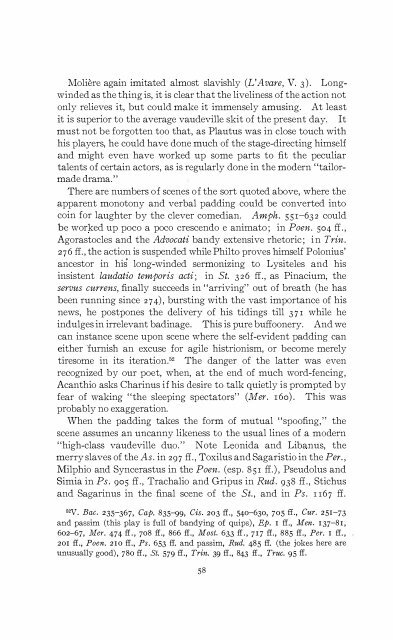You also want an ePaper? Increase the reach of your titles
YUMPU automatically turns print PDFs into web optimized ePapers that Google loves.
Moliere again imitated almost slavishly (L'Avare, V. 3). Longwinded<br />
as the thing is, it is clear that the liveliness of the action not<br />
only relieves it, but could make it immensely amusing. At least<br />
it is superior to the average vaudeville skit of the present day. It<br />
must not be forgotten too that, as Plautus was in close touch with<br />
his players, he could have done much of the stage-directing himself<br />
and might even have worked up some parts to fit the peculiar<br />
talents of certain actors, as is regularly done in the modern "tailormade<br />
drama."<br />
There are numbers of scenes of the sort quoted above, where the<br />
apparent monotony and verbal padding could be converted into<br />
coin for laughter by the clever comedian. Amph. 551-632 could<br />
be worked up poco a poco crescendo e animato; in Poen. 504 ff.,<br />
Agorastocles and the Advocati bandy extensive rhetoric ; in Trin.<br />
276 ff., the action is suspended while Philto proves himself Polonius'<br />
ancestor in his long-winded sermonizing to Lysiteles and his<br />
insistent laudatio temp oris acti ; in St. 326 ff., as Pinacium, the<br />
servus currens, finally succeeds in "arriving" out of breath (he has<br />
been running since 274) , bursting with the vast importance of his<br />
news, he postpones the delivery of his tidings till 371 while he<br />
indulges in irrelevant badinage. This is pure buffoonery. And we<br />
can instance scene upon scene where the self-evident padding can<br />
either 'furnish an excuse for agile histrionism, or become merely<br />
tiresome in its iteration.52 The danger of the latter was even<br />
recognized by our poet, when, at the end of much word-fencing,<br />
Acanthio asks Charinus if his desire to talk quietly is prompted by<br />
fear of waking "the sleeping spectators" (Mer. 160). This was<br />
probably no exaggeration.<br />
When the padding takes the form of mutual "spoofing," the<br />
scene assumes an uncanny likeness to the usual lines of a modern<br />
"high-class vaudeville duo." Note Leonida and Libanus, the<br />
merry slaves of the As. in 297 ff., Toxilus and Sagaristio in the Per.,<br />
Milphio and Syncerastus in the Poen. (esp. 851 ff.), Pseudolus and<br />
Simia in Ps. 905 ff., Trachalio and Gripus in Rud. 938 ff., Stichus<br />
and Sagarinus in the final scene of the St., and in Ps. II67 ff.<br />
52V. Bae. 235-367, Cap. 835-99, Cis. 203 ff., 540-630, 705 ff., Cur. 251-73<br />
and passim (this play is full of bandying of quips), Ep. 1 ff., Men. 137-81,<br />
602-67, Mer. 474 ff., 708 ff., 866 ff., Most. 633 ff., 717 ff., 885 ff., Per. I ff.,<br />
201 ff., Poen. 210 ff., Ps. 653 ff. and passim, Rud. 485 ff. (the jokes here are<br />
unusually good), 780 ff., St. 579 ff., Trin. 39 ff., 843 ff., True. 95 ff.<br />
58
















